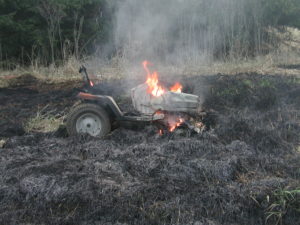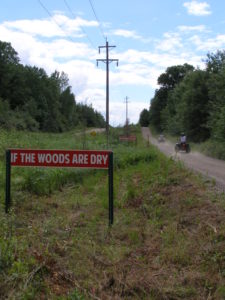by Catherine Koele, wildfire prevention specialist, Wisconsin DNR
It’s no surprise that the number one cause of wildfires in Wisconsin is from human carelessness. What is surprising is that the peak of fire season is in the spring, shortly after the snow-cover disappears and just before vegetation greens-up. Many individuals this time of year are outdoors burning leaves, brush and pine needles from their annual yard clean-up. All too often, this method of debris disposal can spark a wildfire.

This lawn mower caused a wildfire while operating on dry vegetation during elevated fire conditions. Proper maintenance could have prevented this fire.
The reality is, there are numerous other ways a wildfire can occur, such as campfires, fireworks and ashes from woodstoves. A close second behind debris burning is equipment. Nearly 20% of all wildfires in Wisconsin are caused by activities such as logging and farm operations, hot exhaust systems from vehicles, recreational vehicles, such as ATV’s or motorcycles, operating without spark arresters or even simple things like dragging chains from trailers.
Most of these fires can be prevented by doing routine maintenance on equipment to ensure machinery is clean from debris or carbon build-up and checking tire pressure and brakes to avoid metal-to-metal contact. Taking the time to look around before parking hot exhaust systems or pipes in dry, grassy areas can also make a difference. And, getting an early start with any logging and farm operations during times of elevated fire danger. This can greatly decrease your chances of starting a wildfire since temperatures are warmer, humidity decreases and winds are gustier in the afternoon which can lead to rapid fire spread.

“If the woods are dry, and the winds are high, before your next turn, think before you burn!” A series of Burma Shave signs along a popular ATV trail remind folks to be fire safe.
To help support these fire safe recommendations, the DNR launched a new multi-year fire prevention campaign focusing on equipment-caused fires. The key messages intend target the general public and promote proper auto and recreational vehicle use and chainsaw operations. Then, the focus will shift to industry such as business-based logging, farming, welding and grinding operations. The end goal is to heighten awareness that equipment can cause a wildfire, encourage routine maintenance, make good decisions when operating this type of equipment under elevated fire conditions and ultimately adopt a fire safe lifestyle for future generations.
If you see opportunities to help spread the message about equipment-caused wildfires in your community, feel free to contact Catherine Koele, Wisconsin DNR, wildfire prevention specialist, catherine.koele@wisconsin.gov
